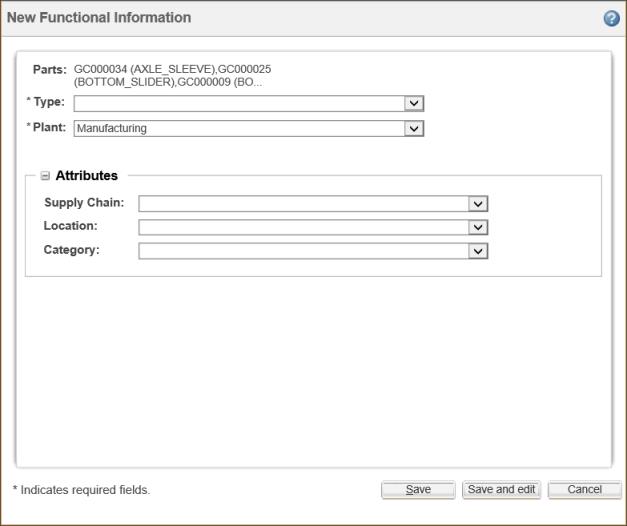Creating Plant-specific Functional Data from Windchill
Use the New Functional Information action to create a single or multiple plant-specific functional data objects of the same type or of different types.
Before you begin, ensure that you have configured the appropriate preferences that are required for creating plant-specific functional data objects. For more information, see
Considerations for Creating a Plant-specific Functional Data Object.
|
|
Only those users who are a member of the PTC MPMLink Module License, PTC Manufacturing License, or PTC BOM Transformation License profile have access to the New Functional Information action.
|
You can launch the New Functional Information action for a part, view-specific enterprise data, or managed collection. Perform the following procedure to create a plant-specific functional data object:
1. Select the objects for which you want to create plant-specific functional data, and launch the New Functional Information action from any of the following locations:
◦ Folder Contents table:
> on the Actions menu.
New Functional Information on the right-click actions menu.
◦ Search Results table:
> on the Actions menu.
New Functional Information on the right-click actions menu.
◦ Part structure browser:
> on the actions toolbar.
> on the right-click actions menu.
◦ MAPSB:
New Functional Information on the right-click actions menu.
The New Functional Information window opens. It displays the names of the selected parts or the parts associated with the selected view-specific enterprise data objects.
2. Specify the following details for the plant-specific functional data object:
◦ In the Type list, select a type for the object.
| The options displayed in the list are based on the values configured in the List of Applicable Plant-specific Functional Data Types preference. If the preference is not set, the Type list displays all the types of plant-specific functional data defined in the Type and Attribute Management utility. For more information on the preference, see Preferences in MPMLink. |
◦ In the Plant list, select the plant to be associated with the object.
| The options displayed in the list are based on the values configured in List of Applicable Views and List of Plant-Specific Views preferences. The plants that are common between the preferences are displayed in the Plant list. If the preferences are not set, the Plant list displays all the plants. For more information on the preferences, see Preferences in MPMLink. |
◦ Enter the supply chain, location, and category information. Provide unique values when you want to create multiple plant-specific functional data objects but of the same type. The action of creating a new object will fail if a similar object with the same type, supply chain, location, and category details is already associated with the same plant.
3. Click Save to create the plant-specific functional data.
The plant-specific functional data objects that were created are displayed along with any issues encountered in a notification banner.
The attributes that uniquely identify a plant-specific functional data object are displayed in this sequence: view, plant-specific functional data object type, supply chain, location, category. For example, PlantMfg, Purchasing, 003, 001, Quality.
| Clicking Save and edit opens the Edit Plant Information window. In this window, you can edit the attributes of the plant-specific functional data objects that you are creating. You can also edit the attributes of the associated view-specific enterprise data objects in this window. For more information, see Editing Plant Information. |
